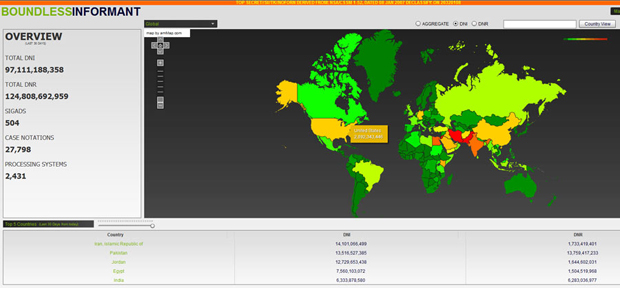Index relies entirely on the support of donors and readers to do its work.
Help us keep amplifying censored voices today.

Caspar Bowden
While the official Chinese reaction to Edward Snowden’s Prism leaks has been muted, ordinary Chinese have been quick to point out the US’ double standard on espionage, Alice Xin Liu writes

Snapshot of Boundless Information global heat map of data collection. The color scheme ranges from green (least subjected to surveillance) through yellow and orange to red (most surveillance). (NSA)
Index on Censorship calls upon the US government to uphold the First Amendment. Whistleblowers such as Edward Snowden — as well as journalists reporting on the Prism scandal, who have come under fire — should be protected under the first amendment, not criminalised.
Index also condemns the alleged tapping of communications cables by the NSA and GCHQ, that would allow the mass surveillance of both meta data and content from individuals’ private communications.
Index CEO Kirsty Hughes said:
“The mass surveillance of citizens’ private communications is unacceptable – it both invades privacy and threatens freedom of expression. The US government cannot use the excuse of national security to justify either surveillance on this scale or the extradition of Snowden for revealing it.”
Index on Censorship is extremely concerned about the reported extent of mass surveillance of both meta data and content, resulting from the alleged tapping into underwater cables that carry national and international communications traffic.
Index calls on the UK government to clarify the extent and legality of the alleged surveillance by GCHQ. Index believes that GCHQ is circumventing laws such as the Regulation of Investigatory Powers Act (RIPA) to allow surveillance that undermines the human rights of British and other citizens.
Index CEO Kirsty Hughes said:
“The mass surveillance of citizens’ private communications is unacceptable – it both invades privacy and threatens freedom of expression. The government cannot continue to cite national security as a justification without revealing the extent of its intrusion and the legal basis for collecting data on this scale. Undermining freedom of expression through mass surveillance is more likely to endanger than defend our security.”
Index is calling on the British government to:
• Confirm whether GCHQ is undertaking the mass surveillance of meta data and content by tapping into communications cables
• Clarify which laws are being used to authorise the collection of data by this method and on this scale
• Commit to protecting the right to privacy and to freedom of expression of people living in the UK and beyond